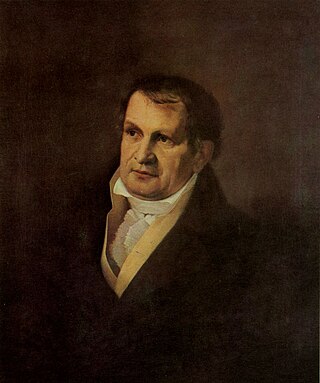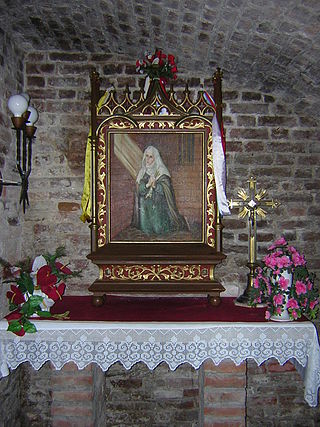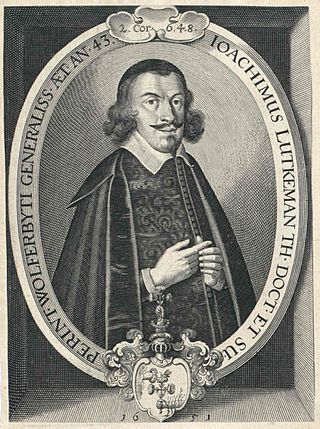Related Research Articles

Hartmann Schedel was a German historian, physician, humanist, and one of the first cartographers to use the printing press. He was born and died in Nuremberg. Matheolus Perusinus served as his tutor.

Johannes Gensfleisch zur Laden zum Gutenberg was a German inventor and craftsman who invented the movable-type printing press. Though movable type was already in use in East Asia, Gutenberg's invention of the printing press enabled a much faster rate of printing. The printing press later spread across the world, and led to an information revolution and the unprecedented mass-spread of literature throughout Europe. It had a profound impact on the development of the Renaissance, Reformation, and humanist movements.

Kwidzyn is a town in northern Poland on the Liwa River. With a population of 37,975, it is the capital of Kwidzyn County in the Pomeranian Voivodeship.

Johann Ludwig Tieck was a German poet, fiction writer, translator, and critic. He was one of the founding fathers of the Romantic movement in the late 18th and early 19th centuries.

Jakob Andreae was a significant German Lutheran theologian and Protestant Reformer involved in the drafting of major documents.

Dorothea of Montau was an anchoress and visionary of 14th century Prussia. After centuries of veneration in Central Europe, she was canonized in 1976.
Jakob Guttmann was a German-Jewish philosopher of religion (Religionsphilosoph) and rabbi. He officiated as chief rabbi of the Land rabbinate of Hildesheim between 1874 and 1892. Thereafter he served as rabbi in Breslau until his death.
Karl Werner was an Austrian theologian.

Greta Schröder was a German actress. She is best known for the role of Thomas Hutter's wife and Count Orlok's victim in Nosferatu (1922). In the fictionalized 2000 film Shadow of the Vampire, she is portrayed as having been a famous actress during the making of Nosferatu, but in fact she was little known. The bulk of her career was during the 1920s, and she continued to act well into the 1950s, but by the 1930s her roles had diminished to only occasional appearances. Following a failed marriage with struggling actor Ernst Matray, she was married to actor and film director Paul Wegener.
Mątowy Wielkie is a village in the administrative district of Gmina Miłoradz, within Malbork County, Pomeranian Voivodeship, in northern Poland. It lies approximately 5 kilometres (3 mi) west of Miłoradz, 13 km (8 mi) west of Malbork, and 43 km (27 mi) south of the regional capital Gdańsk. The village of 353.

Johannes Mentelin, sometimes also spelled Mentlin, was a pioneering German book printer and bookseller active during the period during which incunabula were printed. In 1466, he published the first printed Bible in the German language, the Mentelin Bible.

Max Halbe was a German dramatist and main exponent of Naturalism.
Heinrich Gelzer was a German classical scholar. He wrote also on Armenian mythology. He was the son of the Swiss historian Johann Heinrich Gelzer (1813–1889). He became Professor of classical philology and ancient history at the University of Jena, in 1878. He wrote a still-standard work on Sextus Julius Africanus. He worked out the chronology of Gyges of Lydia, from cuneiform evidence, in an 1875 article.
Lucas Maius was a German Protestant pastor who converted from Lutheranism to Calvinism, and playwright during the Protestant Reformation.

Joachim Lütkemann was a German Lutheran theologian and writer of devotional literature.

Karlheinz Oswald is a German sculptor known for his portraits and cast iron sculptures, many of dancers, often displayed in public places. He studied at the Johannes Gutenberg University in Mainz from 1981, and between 1983 and 1988 worked in Thomas Duttenhoefer's studio in Wiesbaden. Oswald began to produce his first sculptures of dancers in 1988, and the following year his first stained glass windows were displayed at the International Sculpture Symposium in Dreieich. He has operated his own workshop since 1989. In 1991 he won the Sports Toto prize including a trip to New York where he studied movements of dancers at the Alvin Ailey American Dance Theater. He collaborated from 1996 with dancers of the Deutsche Staatsoper Unter den Linden in Berlin, who inspired his sculptures.

Henri Friedlaender (1904–1996) was an Israeli typographer and book designer. He co-founded the Hadassah Printing School and served as the first director of the school.

Johannes Burckhardt was a German Protestant minister, who founded an organisation for female young Protestants, and for a mission at stations, Bahnhofsmission.
Heinrich Heshusius was a prominent third-generation German Lutheran pastor, superintendent, and polemicist. He was the second son of Tilemann Heshusius and Hanna von Bert, two well-educated and influential German Lutherans from Wesel on the lower Rhine.

Johann Jacob Hess was a Protestant Swiss theologian and clergyman.
References
- ↑ Karl Franz Otto Dziatzko: Was wissen wir von dem Leben und der Person Joh. Gutenbergs? In: Sammlung bibliothekswissenschaftlicher Arbeiten. 8. Heft., Leipzig 1895
- ↑ Barbara Wolf-Dahm (1992). "Johannes Marienwerder". In Bautz, Friedrich Wilhelm (ed.). Biographisch-Bibliographisches Kirchenlexikon (BBKL) (in German). Vol. 3. Herzberg: Bautz. cols. 475–479. ISBN 3-88309-035-2.
- ↑ GW. Willkommen